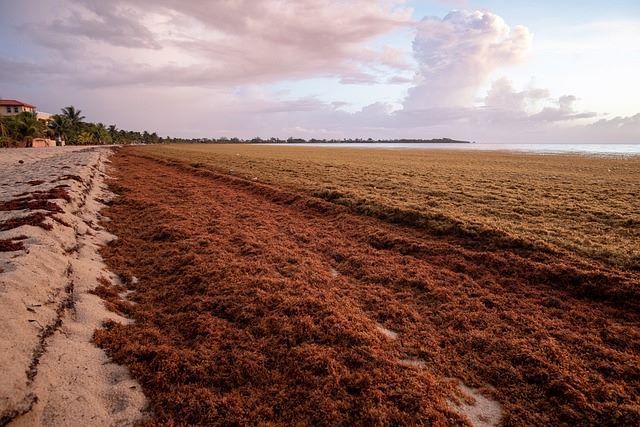Cutting-Edge Advances in Hurricane Science, Sustainability, and Sargassum Utilization
Amazing progress has been made this year in InIA in a wide variety of areas, from the description of hurricanes to the use of drones in the field of sustainability, and even to the use of sargassum to manufacture fuels, fertilizers, and bactericidal nanoparticles.

From describing hurricanes to using drones in the field of sustainability to using sargassum to make fuels, fertilizers, and nanoparticles that kill bacteria, the advances of the teams at the Institute of Applied Research and Technology (InIAT) this year never cease to amaze us. If you liked the first and second installments about the other equally impressive advances, you will enjoy this third and final installment.
Hurricanes: mathematical description versus current data
Hurricanes are a meteorological phenomenon that can cause serious damage to communities, so our IBERO researcher is working on a two-pronged approach. In the theoretical section, this type of rotating fluid is defined by statistical physics. In the informative section, data from meteorological stations are used.
This mathematical description aims to solve these equations numerically and make a comparison with current data. All this, together with the application of machine learning, can give good results in the future.
The project, "Contribution in viscosities for a rotating fluid: a kinetic deduction for a dilute relativistic gas out of equilibrium," was presented by Dr. Alma Rocío Sagaceta-Mejía, coordinator of the Bachelor's Degree in Actuarial Science.
Fuel for Caribbean boats from sargassum
One of the problems that have grown in the last decade is the voluminous arrivals of sargassum to the coasts of the Caribbean Sea, so IBERO researchers are working on the installation of value chains in these areas, with biorefineries that produce bio-oil from sargassum to be used as fuel for ships in those ports.
And given that the flow of this seaweed is not constant, they are considering an operating model that will allow them to process all the sargassum that arrives and, to cover the demand for fuel, generate what is needed from organic waste from restaurants and hotel areas. Currently, they already have a biorefinery that only needs the installation of distillation and filtration processes to start it up.
The project, "Transformation of marine and lignocellulosic biomass into valuable products under the biorefinery scheme," was presented by Dr. Juan Martínez Gómez, Coordinator of the Chemical Engineering Department.
Slow-release fertilizer capsules
The use of fertilizers improves crop yields, but a large portion of these substances leach into aquifers and cause pollution in the long and medium term. This IBERO research team is making controlled-release fertilizer capsules so that the fertilizer stays in the soil longer and works more slowly. This makes the fertilizer more effective and less harmful to the environment.
To do this, they extracted carbohydrates from biomasses such as sargassum and reacted them with a compound called methyl methacrylate that formed an enveloping network, which was then spray-dried. The next step is to test these small spheres, which are four to five micrometers in size.
Dr. Gregorio Nicolás Juárez Luna presented the project, "Extraction of structural polysaccharides from plant and marine biomass for the encapsulation of high-efficiency colloidal fertilizers by spray drying."
Textiles with silver particles against bacteria
The presence of nanoparticles (smaller than 0.1 thousandths of a millimeter) of silver improves the bactericidal properties of textiles, but so far these nanoparticles have not been produced by green methods. And it is here that our IBERO research team introduced in this process the use of the green method of synthesis in an organic medium to produce these metallic particles, which will be added to textiles made of 50% bamboo fiber and 50% cotton, which are soft and hypoallergenic.
In addition, they will take advantage of a resource that is increasing on Caribbean beaches: sargassum. Even though this alga has some problems, like having too much salt, our researchers are working on better ways to clean it.
The nanomaterials in functional and sustainable textiles project Providing a textile of bamboo and cotton fibers with improved properties through the incorporation of silver particles was presented by Dr. Esther Ramírez Meneses, from the Department of Chemical, Industrial, and Food Engineering.
Use of drones for sustainability
During the pandemic years, when people were stuck at home, IBERO researchers did a broad review of how drone technologies relate to sustainability, as well as to social and community processes. They found that most of these drones are used for power, pipelines, agriculture, or monitoring biodiversity, but not for land management.
That is why, as soon as conditions allowed them to leave home, they conducted test flights with a drone of InIAT's design and developed a methodology for processing the information captured with it. They are currently working on several projects, such as a plan for managing the environment in La Sabana, Jaltepec, a proposal for the Consortium's Frontier Science call, and possibly joining the Flying Labs consortium.
The project Evaluation of the technological, environmental, and social appropriation of the use of drones for diverse socio-cultural contexts in the field of sustainability was presented by Dr. Juan Manuel Núñez Hernández, from the University Transdisciplinary Center for Sustainability (CENTRUS). The presentation of these projects was broadcasted on the Ibero Research and Postgraduate YouTube channel.
Text: Yazmín Mendoza, Source: InIAT




